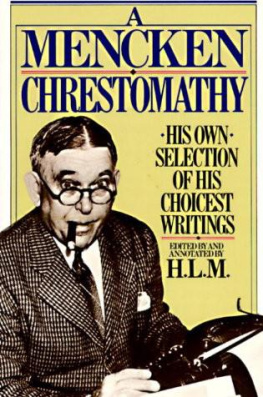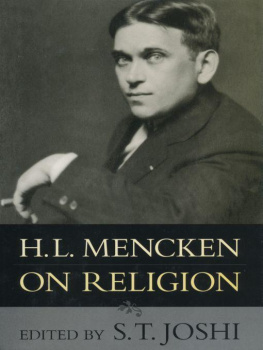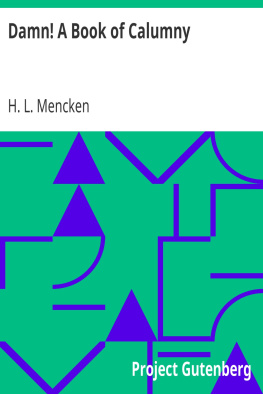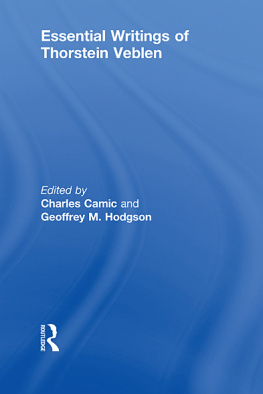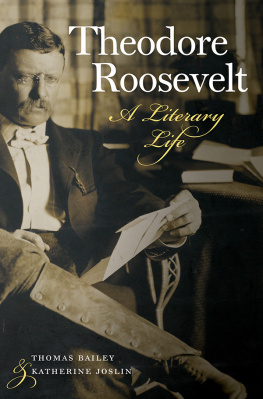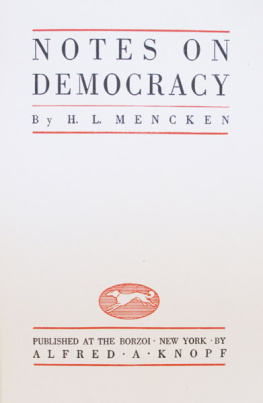First Vintage Books Edition, May 1982
Copyright 1916, 1918, 1919, 1920, 1921, 1922, 1924, 1926, 1927
1932, 1934, 1942, 1949 by Alfred A. Knopf, Inc.
All rights reserved under International and Pan-American
Copyright Conventions. Published in the United States by
Random House, Inc., New York, and simultaneously in Canada
by Random House of Canada Limited, Toronto. Originally
published by Alfred A. Knopf, Inc., New York, in June 1949.
Library of Congress Cataloging in Publication Data
Mencken, H. L. (Henry Louis), 1880-1956.
A Mencken chrestomathy.
Reprint. Originally published: New York: Knopf, 1949.
I. Title.
[PS3525.E43A6 1982] 818.5209 81-52593
eISBN: 978-0-307-80887-5 AACR2
v3.1
PREFACE

I N my title I revive the word chrestomathy in its true sense of a collection of choice passages from an author or authors, and ignore the late addition of especially one compiled to assist in the acquirement of a language. In the latter significance the term is often used by linguists, and some of the chrestomathies issued by them in recent yearsfor example, Dr. Edgar H. Sturtevants Hittite Chrestomathy of 1935 are works of capital importance. But I see no reason why they should have a monopoly on what is not, after all, their invention. Nor do I see why I should be deterred by the fact that, when this book was announced, a few newspaper smarties protested that the word would be unfamiliar to many readers, as it was to them. Thousands of excellent nouns, verbs and adjectives that have stood in every decent dictionary for years are still unfamiliar to such ignoramuses, and I do not solicit their patronage. Let them continue to recreate themselves with whodunits, and leave my vocabulary and me to my own customers, who have all been to school. Chrestomathy is actually more than a century old in English, which makes it quite as ancient as scientist, which was invented by William Whewell in 1840, or anesthetic, which was proposed by Oliver Wendell Holmes I in 1846. In Greek, where it was contrived by joining chrestos, meaning useful, and mathein, meaning to learn, it goes back to Proclus Disdochos, who used it in Athens in the year 450.
Whether anyone will find anything useful in what follows, or learn from it otherwise, is not for me to guess, but at all events I like the word better than the omnibus, reader, treasury, miscellany, panorama and portable that have been so horribly overworked of late. The aim of the volume is simply to present a selection from my out-of-print writings, many of them now almost unobtainable. They come mostly from books, but others are magazine or newspaper pieces that never got between covers, and a few of them are notes never previously published at all. I have an enormous collection of such notes, mainly accumulated for books that, after long struggles, failed to get themselves written, and some day I may gather them into a couple of volumes. The books levied on here are the six of the Prejudices series, A Book of Burlesques, Damn: a Book of Calumny, In Defense of Women, Making a President, Notes on Democracy and Treatise on Right and Wrong. All save two of these had fair successes in their day, and I still receive frequent correspondence about them, but they are so full of the discussion of matters now of only historical interest that I have hesitated to let them be reprinted in toto. It seemed to be much more rational to dig out of them the material that continues to be of more or less current interest, and to print all of it in one volume, at a price substantially less than the cost of a dozen. I have done my own editing, and the judicious may observe some evidence that I have occasionally allowed partiality to corrupt judgment, but I assume that any other editor would have been guilty of a similar softness. Some of the lesser pieces followingfor example, The Sahara of the Bozart, my bathtub hoax and my translation of The Declaration of Independence into the American vulgatehave carried on a vigorous life for years, and I have therefore thought it worth while to give them one more embalming before consigning them to statistics and the devil.
In general, I have made few changes in the original texts, and in consequence several thumpingly false prophecies and other howlers are preserved. But when it seemed to make for clarity I have not hesitated to change the present tense into the past, and to omit repetitive and otherwise unnecessary passages. In all cases where I could determine it I have given the date and place of original publication. My later booksfor example, The American Language and its Supplements and the three Days booksare not represented, for all of them are still in print. For the same reason I have passed over The Artist, Christmas Story and Treatise on the Gods, the last of which came out in a revised edition so recently as 1946. What the total of my published writings comes to I dont know precisely, but certainly it must run well beyond 5,000,000 words. A good deal of it, of course, was journalism pure and simpledead almost before the ink which printed it was dry. But I certainly do not regret that I gave so much of my time and energy, especially in my earlier years, to this journalism, for I had a swell time concocting it, and in its day it got some attention. Even in my later years, with wisdom radiating from me like heat from a stove, I have occasionally gone back to it, to my complete satisfaction and the apparent approval (or horror) of the customers. There is something delightful about getting an idea on paper while it is still hot and charming, and seeing it in print before it begins to pale and stale. My happiest days have been spent in crowded press-stands, recording and belaboring events that were portentous in their day, but are now forgotten. These recordings usually died with the events, but I am well aware, as an old book reviewer, that multitudes of books have died too, including many once gloated over as masterpieces.
Those who explore the ensuing pages will find them marked by a certain ribaldry, even when they discuss topics commonly regarded as grave. I do not apologize for this, for life in the Republic has always seemed to me to be far more comic than serious. We live in a land of abounding quackeries, and if we do not learn how to laugh we succumb to the melancholy disease which afflicts the race of viewers-with-alarm. I have had too good a time of it in this world to go down that chute. I have witnessed, in my day, the discovery, enthronement and subsequent collapse of a vast army of uplifters and world-savers, and am firmly convinced that all of them were mountebanks. We produce such mountebanks in greater number than any other country, and they climb to heights seldom equalled elsewhere. Nevertheless, we survive, and not only survive but also flourish. In no other country known to me is life as safe and agreeable, taking one day with another, as it is in These States. Even in a great Depression few if any starve, and even in a great war the number who suffer by it is vastly surpassed by the number who fatten on it and enjoy it. Thus my view of my country is predominantly tolerant and amiable. I do not believe in democracy, but I am perfectly willing to admit that it provides the only really amusing form of government ever endured by mankind.
Baltimore H. L. M ENCKEN
CONTENTS
I. HOMO SAPIENS

